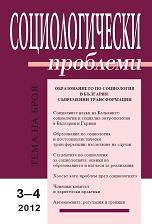Студентите по социология за образованието по социология (Резултати от емпирично изследване на студентските практики и нагласи)
Sociology Students on Sociology Education: Results of an Empirical Survey of Student Practices and Attitudes
Author(s): Todor GalevSubject(s): Social Sciences
Published by: Институт по философия и социология при БАН
Keywords: the specialty of sociology; university education; attitudes for professional realization; student labour; sociology education;
Summary/Abstract: The article analyzes the results of an empirical sociological study of third and fourth-year students in sociology in four different Bulgarian universities. The analysis comprises: the social-demographic characteristics of the studied population; the factors that have influenced the choice of specialty and of remaining in that specialty; the work experience of students and their assessments regarding the skills and knowledge acquired during training as well as their attitudes regarding their future professional realization. The analysis shows significant differences between universities by each of these groups of indicators. Among the social-demographic characteristics, the most significant differences are in the degree of feminization of the specialty and in the education level of the parents, the distances from the respective university to the place of birth and to the city in which the student completed secondary education. The latter seems to be an important factor determining one of the studied universities as „regional“. The choice of specialty is determined foremost by the belief of students that sociology education will give them general knowledge and skills for a better understanding of present-day society, while other factors, related to the view that university education provides knowledge and skills for future professional realization, remains in second place. Normative requirements prove predominantly determining for the participation of students in the education process compared with factors like personal motivation and self-initiative. This largely explains the seeming contradiction between the declared desire of the majority of students for a practical orientation of their studies and their low degree of activeness in seeking possibilities for professional realization and acquiring work experience. This passivity determines to a great degree the lack of knowledge (and experience) regarding the concrete labour market conditions, especially regarding the specific market of sociological competence. Hence it is understandable that, despite the high share of working students (more than 65%), the majority of them assess their job as something they would continue to work at only until a better opportunity turns up.
Journal: Социологически проблеми
- Issue Year: 44/2012
- Issue No: 3-4
- Page Range: 152-185
- Page Count: 34
- Language: Bulgarian
- Content File-PDF

